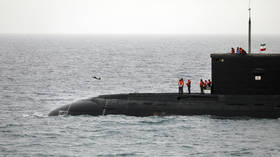US fueling tension in Middle East with ‘Iranophobia’ – FM

The US is attempting to stoke tensions across the Middle East by “relying on the failed policy of Iranophobia,” Iranian Foreign Ministry spokesman Nasser Kanani said on Sunday, following US President Joe Biden’s visit to the region.
The US was “the first country to deploy a nuclear bomb… it constantly interferes with other countries’ affairs, has launched armed conflicts, and has sold massive amounts of arms across the region,” the official continued.
He added that Washington was also, via its unflinching support for Israel, “the main accessory to the continued occupation of Palestinian lands, daily crimes of the regime against Palestinians, and apartheid.”
Iranian President Ebrahim Raisi on Thursday threatened the US and its allies with a “harsh and regrettable response” should they make a “mistake” in dealing with Iran, accusing Washington and Israel of creating instability in the region.
His statement came after US President Joe Biden and Israeli Prime Minister Yair Lapid signed an agreement pledging “never to allow Iran to acquire a nuclear weapon” and to “use all elements of its national power to ensure that outcome.”
Biden later signed a statement in partnership with Saudi Arabia denouncing the “increasing threat” posed by Iranian-made drones. Washington has repeatedly accused Tehran of attempting to sell such drones to Russia, allegations Iran has repeatedly denied.
The US withdrew from the 2015 JCPOA nuclear deal in 2018 under former president Donald Trump. Despite campaign promises to resurrect the deal, which would involve a repeal of anti-Iranian sanctions in return for restricting uranium enrichment, Biden made no progress on the issue during his first trip to the Middle East.
Biden reassured US allies in the Gulf that Washington was not planning on leaving the region. During a summit of Gulf Cooperation Council nations plus Egypt, Jordan and Iraq in Jeddah, he promised: “We will not walk away and leave a vacuum to be filled by China, Russia or Iran.”
While some of Washington’s Middle Eastern allies favor uniting against Tehran, with King Abdullah of Jordan recently making reference to a “Middle East NATO,” others including the United Arab Emirates have resisted the idea, preferring cooperation.












